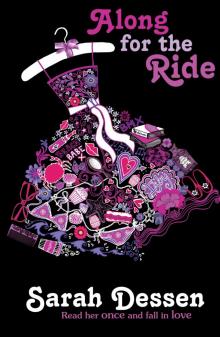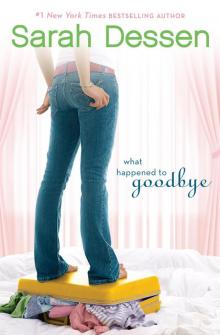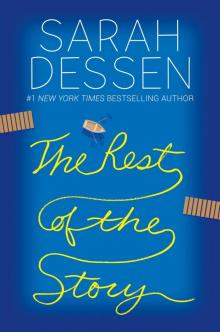- Home
- Sarah Dessen
Just Listen Page 4
Just Listen Read online
Page 4
“That’s probably best,” my dad said, glancing back at all of us at the table before taking the phone farther into the kitchen. “I just don’t think the time’s right.”
Kirsten, who was chewing on a piece of bread, said, “Right for what?”
“A job,” Whitney told her, her voice flat. “Why else would Lindy call during dinner?”
My dad was rummaging in the drawer by the phone now, finally digging out a pencil. “Well, okay,” he said, grabbing a nearby notepad. “I’ll just take down the info, but most likely…right. What was that address, again?”
My sisters were both watching him as he scribbled it down, probably wondering what the job was for, and for whom. But I was looking at my mom, who had her eyes on my dad as well, even as she drew her napkin out of her lap, dabbing the corners of her mouth. When he came back in, settling into his chair and picking up his fork, I waited for my sisters to ask for details. But instead, my mom spoke first.
“So what was that about?”
My dad looked at her. “Oh,” he said, “just an audition tomorrow. Lindy thought we might be interested.”
“We?” Kirsten said.
“You,” my dad told her, scooping some beans onto his fork. “I told her it probably isn’t a good time. It’s in the morning, and I’ve got to be at the office….”
He trailed off, not bothering to finish—not that he had to. My dad was an architect and busy enough with his own work, plus taking care of my mom and keeping up the house, without having to deal with running us all over town. Kirsten knew this, even though it was obvious she was disappointed. But then, in the quiet as we all went back to eating, I heard my mom take in a breath.
“I could take her,” she said. We all looked at her. “I mean, if she wanted to go.”
“Really?” Kirsten asked. “Because that would be—”
“Grace,” my dad said, his voice concerned. Kirsten sat back in her chair, now quiet. “You don’t have to.”
“I know.” My mom smiled, a wan smile, but a smile just the same. “It’s just one day, though. One thing. I’d like to.”
So the next day, my mom was up for breakfast—I remember that, clearly—and when Whitney and I left for school, she and Kirsten headed off to an audition for a local bowling alley commercial. Kirsten got the job. It was by no means her first ad, and not a very big one, as things went. But every time it ran afterwards, and I saw her bowl that perfect strike (edited in, as my sister was a terrible bowler, the queen of the gutter ball), I thought about that night at the table and how, finally, it seemed like things might be getting back to normal.
And they did, more or less. My mom started taking us around to auditions again, and while she wasn’t always cheerful and perky, maybe she actually never had been in the first place. Maybe that, like so much else, I’d only imagined, or assumed. Still, as that year went on, I had trouble trusting that things were really getting better. As hopeful as I wanted to be, I always felt like I was holding my breath, sure that it wouldn’t last. And even when it did, the fact that what had happened to my mom had come on so suddenly, with no beginning or true end, made it seem that much more likely to reappear in the same fashion. Back then, I always felt like it would take only one bad event, one disappointment, for her to leave us again. Maybe I felt that way still.
This was one reason why I hadn’t yet told my mom I wanted to quit modeling. The truth was that all summer, when I went to go-sees, I felt strange, nervous in a way I never had before. I didn’t like the scrutiny, having to walk in front of people, strangers staring at me. At one fitting for a swimsuit shoot in June, I’d kept cringing when the stylist tried to adjust my bathing suit, a lump rising in my throat even as I apologized and said I was fine.
Each time I got close to telling my mom about this, though, something would happen to stop me. I was the only one left modeling now. And while it is hard enough to take away something that makes a person happy, it’s even more difficult when it seems like it’s the only thing.
Which was why, when I got to Mayor’s Village fifteen minutes later, I was not surprised to find my mother waiting for me. As I turned in, I was struck, as always, by how small she was. Then again, my perspective was a bit skewed, as I was five-eight, and even at that the shortest of my sisters: Kirsten had a half inch on me and Whitney was five-ten. My father loomed above all of us at six-two, leaving my mother to always look sort of odd when we were all together, like one of those which-one-of-these-is-not-like-the-other puzzles we used to do in elementary school.
As I pulled in beside her car, I saw Whitney was in the passenger seat, her arms crossed over her chest. She looked irritated, which was neither surprising nor new, so I didn’t dwell on it as I grabbed my makeup bag from my purse and went around to meet my mother, who was standing by her bumper, the hatch open.
“You didn’t have to come,” I said.
“I know,” she replied, not looking up as she handed me a Tupperware container with a plastic fork balanced on top of it. “Fruit salad. I didn’t have time to make a sandwich. Sit down.”
I sat, then opened the container, digging in the fork to take a bite. I realized I was starving, which made sense, considering I’d thrown up the small amount of lunch I’d managed to get down. God, what a crappy day.
My mother took my makeup bag from me and began to rummage through it, taking out an eye-shadow compact and my powder. “Whitney,” she called out, “hand those clothes back here, would you?”
Whitney sighed loudly, then turned around, reaching for the shirts that were hanging from the hook on the door behind her. “Here,” she said flatly, barely extending them over the backseat. My mother reached for them, her fingertips falling short, so I turned around to get them for her. As my hand closed over the hangers and I tried to pull them toward me, Whitney held on for a second longer, her grip surprisingly strong as our eyes met. Then she let go, suddenly, and turned back around.
I was trying to be patient with my sister. To remember, at times like this, that it wasn’t her I was upset with, but her eating disorder. But at times like this, it looked a lot like Whitney, and vice versa, so it was hard to tell the difference.
“Have some water,” my mother said now, handing me an open bottle as she took the shirts from me. “And look here.”
I took a sip, staying still as she dusted powder across my face. Then I closed my eyes, listening to cars go by on the highway behind us, as she applied shadow and liner before beginning to rifle through the shirts, the hangers clanking. I opened my eyes to see her holding a pink suede top out at me.
Shhh, Annabel. It’s just me.
“No,” I said. It came out harsher than I meant, my voice sharp. I took in a breath, forcing myself to sound more normal as I added, “Not that one.”
She looked surprised, glancing at it, then back at me again. “Are you sure? It looks wonderful on you. I thought you loved this shirt.”
I shook my head, then looked away quickly, focusing on a minivan that was passing by, one of those MY CHILD IS AN HONOR STUDENT stickers on the back window. “No,” I told her again. She was still watching me, so I added, “It cuts me weird, or something.”
“Oh,” I heard her say. She offered me a blue scoop-neck instead. “Here,” she said as I looked at it more closely, seeing a price tag hanging from it. “Hop in and change. It’s three fifty.”
I nodded, then got down off the bumper, walking around to the backseat door and pulling it open. I climbed in, bending down to pull off my tank top, and froze. “Mom,” I said.
“Yes?”
“I don’t have a bra.”
I heard her heels on the pavement as she came around the car. “You don’t?”
I shook my head, trying to stay low in the seat. “I had a tank top on; it’s got one built in.”
My mother thought for a second. “Whitney,” she said. “Give—”
Whitney shook her head. “No way.”
Now it was my mother’s turn to sigh. �
��Honey, please,” she said. “Just help us out, okay?”
And so, as we had for the last nine months or so, we had to wait, and worry, about Whitney. After what felt like a long silence, she finally pulled her arms up under her shirt, fumbled around, then drew a beige bra out of the collar, dropping it back behind her. I grabbed it off the floor, putting it on—we weren’t exactly the same size, but it was better than nothing—then pulled the shirt over it. “Thanks,” I said, but, of course, she ignored me.
“Three fifty-two,” my mother said. “Let’s go, honey.”
I got out of the car, then walked back around to where she was waiting, holding my purse. She handed it to me, then looked at my face one last time, examining her handiwork. “Close your eyes,” she said, reaching forward carefully to draw a clump of mascara off one of my eyelashes. When I opened them, she smiled at me. “You look beautiful.”
“Yeah, right,” I said, but then she gave me a look, so I added, “Thank you.”
She tapped her watch. “Go ahead. We’ll wait for you.”
“You don’t have to. I’ll be fine.”
The car’s engine started suddenly as Whitney turned the key, and then she was rolling down the window, extending her arm outside. She was wearing long sleeves, as always, but you could see a bit of her wrist, pale and so thin, as she tapped her fingers on the side of the car. My mother looked at her, then back at me.
“Well, I’ll at least wait for you to get inside,” she said. “Okay?”
I nodded, then leaned forward to kiss her just above her cheek, so as not to smudge my lipstick. “Okay.”
When I got to the building, I turned around. She lifted her hand, waving, and as I did the same I glanced beyond her at Whitney, whose face I could see framed in the side mirror. She was watching me, too, her face expressionless, and, like so often lately, I felt a twinge, something twisting in my stomach.
“Good luck,” my mother called out, and I nodded, then looked back at Whitney. But she’d slid down in her seat and disappeared from view, leaving the mirror empty.
Chapter THREE
Whitney had always been skinny. While Kirsten was voluptuous and curvy, and I was more wiry and athletic, my middle sister had been born with the true model’s body, tall and rail-thin. Kirsten and I were always being told by photographers that while we had pretty faces, we were too plump or too short, respectively, to get serious print work. Early on, though, it was clear Whitney had real potential.
So it only made sense that the summer after her senior year, Whitney would move to New York to try her luck modeling there. This was the same thing Kirsten had done two years earlier. After she’d begged my parents to let her move in with two older girls she knew from our agency, they’d agreed on the condition that she also enroll in some college courses. Though at first Kirsten had kept up the balance, once she’d gotten some print work and a couple of commercials, school had fallen by the wayside. Even with the work, though, she still earned the bulk of her money with waitress and hostessing gigs.
Not that this bothered her all that much. Since high school, when she discovered boys and beer—not necessarily in that order—Kirsten’s focus on modeling had dwindled considerably. While Whitney always made sure to get plenty of sleep before a job and arrived on time without fail, Kirsten was much more likely to roll in late, with bedhead and a hangover. One time she’d showed up for a Kopf’s prom dress shoot with a hickey so large they couldn’t even totally cover it with makeup. When the ads ran, weeks later, she’d laughed as she pointed it out to me—a brown circle, barely visible under the strap of her princesslike gown.
My mother had had higher hopes for Whitney. Two weeks after graduation, they packed her stuff and drove up to move her into the apartment where Kirsten was now living alone. To me, this cohabitation seemed like a bad idea from the start. My mom and dad, though, were firm: Whitney was only eighteen, and she needed some family looking out after her, and since my parents were already helping with Kirsten’s rent, she couldn’t really complain. (Although she did, of course.) Besides, my mom said, my sisters were older now, their various conflicts all in the past.
Once Whitney was moved in, my mom stayed on for a little while getting her settled, signing her up for a couple of courses and accompanying her to her first few appointments with agencies. Each night, she called after dinner to fill my dad and me in on what was going on, sounding happier than I’d ever heard her as she reported on celebrity sightings, meetings with agents, and the hectic, amazing pace of New York. Within a week, Whitney had her first go-see, landing her first job soon afterwards. By the time my mom left a month later, she was working much more than Kirsten ever had. Everything was going exactly as planned…until it wasn’t.
My sisters had been living together for about four months when Kirsten started calling my mom and saying Whitney was acting strange. That she’d lost weight, hardly seemed to be eating at all, and was really snippy every time Kirsten tried to broach either topic. At first there didn’t seem to be much cause for concern. Whitney had always been moody, and even my parents hadn’t expected their living situation to go completely smoothly. Most likely, my mom reasoned, Kirsten was being overly dramatic, and if Whitney had lost a little weight, well, she was working in a very competitive market, which meant more pressure about her appearance. As she gained confidence, things would even out.
The next time we saw Whitney, though, the change in her was obvious. Before she’d looked lithe, elegant; now, she was gaunt, and her head seemed too big for her body, weighing down her neck. She and Kirsten flew down together for Thanksgiving, and when we picked them up from the airport, the contrast was startling. There was Kirsten, with her round cheeks and clear blue eyes, wearing a bright pink sweater, her skin warm against mine as she threw her arms around me, shrieking how much she’d missed us all. And beside her, Whitney, in sweatpants, a long-sleeved black turtleneck, no makeup, her skin pale. It was a shock, but at first no one said anything, instead just exchanging hellos and hugs and the basic how-was-the-trip banter. As we walked into baggage claim, though, my mother finally broke.
“Whitney, honey,” my mother said. “You look exhausted. Is that cold you had still hanging on?”
“I’m fine,” Whitney said.
“No, she isn’t,” Kirsten informed us flatly, pulling her suitcase off the carousel. “She doesn’t eat. Ever. She’s killing herself.”
My parents exchanged a look. “Oh, no, she’s just been sick,” my mother said. She looked at Whitney, who was glaring at Kirsten. “Right, honey?”
“Wrong,” Kirsten told her. To Whitney, she said, “Like we talked about on the plane: Either you tell them, or I will.”
“Shut up,” Whitney said, her voice clenched.
“Now, now,” my father said. “Let’s just get the bags.”
This was typical. My father, the lone male in our estrogen-heavy household, had always dealt with any kind of emotional situation or conflict by doing something concrete and specific. Discussion of cramps and heavy flow at the breakfast table? He was up and out the door to change the oil on one of our cars. Coming home in tears for reasons you just didn’t want to discuss? He’d go make you a grilled cheese, which he’d probably end up eating. Family crisis brewing in public place? Bags. Get the bags.
My mother was still studying Whitney, her face concerned. “Honey?” she said, her voice soft, as my dad yanked another suitcase off the belt. “Is this true? Is something wrong?”
“I’m fine,” Whitney said again. “She’s just jealous that I’m working so much.”
“Oh, please!” Kirsten said. “I could give a shit about that, and you know it.”
My mother’s eyes widened, and again I thought of her amongst us, so small, fragile. “Watch your language,” my dad said to Kirsten.
“Dad, you don’t understand,” she told him. “This is serious. Whitney has an eating disorder. If she doesn’t get help, she’ll—”
“Shut up!” Whitney shrieked,
her voice suddenly shrill. “Just shut up!”
This eruption was so startling—we were only used to Kirsten freaking out, ever—that we all just stood there for a second, as if gauging whether it had really happened. But then I saw people in the crowd glancing over at us, making it clear. I saw my mother’s face flush, embarrassed.
“Andrew,” she said, moving closer to my father. “I don’t—”
“Let’s go to the car,” my dad told us, picking up Whitney’s suitcase. “Now.”
We went. In silence, my mother and father walking ahead, his arm clamped over her shoulder, Whitney behind them, head bent down against the breeze, Kirsten and I bringing up the rear. As we walked, she slid her hand down to enclose mine, her palm warm in the cold. “They have to know,” she said, but when I turned my head, she was looking away, and I wondered if she was actually talking to me at all. “It’s the right thing to do. I have to do it.”
When we got in the car, no one spoke. Not as we pulled out of the deck, not when we got on the highway. In the backseat, stuck between my sisters, I kept feeling Kirsten taking in a breath, like she might say something, but no words came. On my other side, Whitney was pressed up against the window, looking out, her hands in her lap. I kept staring at her wrists, which looked thin and knobby and pale against the black of her sweatpants. My parents, up front, both stared straight ahead, and occasionally I’d see my father’s shoulder move, and I knew he was patting my mom’s hand, consoling her.
As soon as we pulled into the garage, Whitney was pushing her door open. Within seconds, she covered the few feet to the door that led to the kitchen, disappearing inside and slamming it behind her. Beside me, Kirsten sighed.

 Just Listen
Just Listen Along for the Ride
Along for the Ride This Lullaby
This Lullaby Once and for All
Once and for All Lock and Key
Lock and Key The Truth About Forever
The Truth About Forever Someone Like You
Someone Like You What Happened to Goodbye
What Happened to Goodbye Dreamland
Dreamland Keeping the Moon
Keeping the Moon The Rest of the Story
The Rest of the Story The Moon and More
The Moon and More What Happens to Goodbye
What Happens to Goodbye